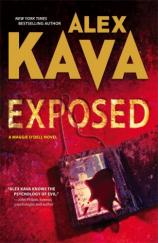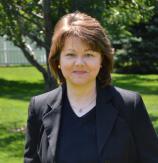Interview: October 3, 2008
October 3, 2008
EXPOSED, the sixth installment in bestselling author Alex Kava's series featuring FBI profiler Maggie O'Dell, finds its protagonist tracking a serial murderer --- whose weapon of choice is a deadly virus --- all the while quarantined inside a government biosafety containment hospital.
In this interview with Bookreporter.com's Joe Hartlaub, Kava describes the real-life people and events that inspired elements of the book's plot, and explains how her experiences in previous careers impact her ability to write novels. She also shares details about her creative process --- including writing and research schedules, test readers and remedies for writer’s block --- and discusses her current projects, which include a work of nonfiction and the next book in the series.
Bookreporter.com: I read EXPOSED, your latest Maggie O’Dell novel, in one sitting. It’s a story about a serial murderer who utilizes a virus as an instrument for murder. It left me with my skin crawling, and that is one of my highest compliments. What came first when you sat down to write EXPOSED: the who --- that being the murderer --- or the virus?
Alex Kava: The virus came first, then my research helped create the killer.
BRC: My favorite part of EXPOSED involved Maggie O’Dell spending a great deal of the novel under quarantine in a government medical facility after being exposed to an unknown pathogen. O’Dell, despite potentially being under a death sentence, begins research that ultimately provides the key to cracking the case. It’s almost the antithesis of the “locked room” mystery, where the detective is the victim and must solve the case from close quarters. EXPOSED almost seemed to be written around O’Dell’s hospitalization. Is that where the book began for you?
AK: It was actually quite the opposite scenario. I always knew Maggie would be exposed, but I decided to ratchet up the suspense by moving her exposure to the first part of the book. I did it without fully realizing she would then be stuck in an isolation facility. I have to admit it was a challenge, but it also brought an opportunity for me to really push Maggie to the edge and make her deal not only with her temporary physical isolation, but her self-imposed isolation in her personal life.
BRC: Contagions are another central element of EXPOSED. We too often forget that there are many organisms, invisible to the naked eye, that are sitting out there patiently waiting to bring us down, and in EXPOSED, one such organism gets a big hand up. What prompted your interest in lethal viruses as a vehicle for murder in EXPOSED?
AK: Years ago, I read an article about an African village that was wiped out by the Ebola virus in a matter of weeks. As a result, an entire region was closed off. No one left or entered without permission. Armed soldiers guarded the borders and were ordered to kill anyone leaving. What could be so deadly that to be just exposed to it warranted an order to be shot? The more research I did about Ebola, the more fascinated I became.
BRC: It is obvious from reading EXPOSED that you spent a great deal of time researching serial murderers during the course of your writing, from the Tylenol Killer to Ted Bundy to the Beltway Snipers. Of all of the killers you researched, who did you find to be the most frightening?
AK: They’re all frightening. Most serial killers choose their victims for specific reasons or because they fit a specific profile. For example, Ted Bundy chose young women with long hair parted down the middle. However, killers like the Tylenol murderer and the Beltway Snipers chose their victims randomly and killed from a distance, what experts call a “remote control” killing. In a sense these killers are even more frightening because they could strike any of us at any time. That’s the kind of killer I wanted to create for EXPOSED.
BRC: How has Maggie O’Dell as a character evolved for you as a writer? Is she where you thought she would be when you first conceived her? Where do you see her going, professionally and personally? Do you see an end to the series, or is it still open-ended? And how much of yourself have you put into Maggie O’Dell’s character?
AK: I never intended to write a series, so I’ve had to get to know Maggie just as my readers have. It was frustrating at first. Some of the challenges and conflicts I gave Maggie in my first novel, A PERFECT EVIL, were interesting but not something I necessarily wanted to revisit again and again. For example, I didn’t intend to go through Maggie’s divorce with her. Being able to go off and write stand-alones actually helps me come back to the series rejuvenated.
BRC: On a related note, what are you presently working on?
AK: I’m finishing the next Maggie, titled BLACK FRIDAY.
BRC: Given all of the research that you put into each of your novels, have you ever had the urge to write a work of nonfiction?
AK: Actually, I’m working on a nonfiction project. One of my sources has become a dear friend. She’s been a prosecutor for 23 years and has tried some precedent-setting cases and has some amazing stories to tell.
BRC: You have an extensive career history in the advertising, marketing and public relations fields. What skills that you honed in those fields have you found to translate to writing fiction?
AK: That’s a tough question because in some ways, absolutely nothing I’ve done before has prepared me to write fiction; and yet, I know that absolutely everything I’ve done has influenced my fiction. Writing is a skill, so all the business writing in my previous careers certainly helped hone the basics. But writing fiction is more about translating experiences and perceptions about life. It’s about finding a voice and a technique to tell a story. It’s about creating characters and relationships, adding conflict, setting a pace, connecting with the reader. I’m not sure this is something you learn until you sit down and actually write fiction.
BRC: On a related note, what would you be doing if you weren’t writing? Do you think you would return to one of your prior vocational fields, or would you do something completely different?
AK: I left my previous job/career because I was burned out and needed a change, so I had already decided that if I didn’t get published within my self-imposed time limit, I would find an entirely new career.
BRC: Some authors have people to whom they turn in order to critique their work in progress; others keep their work under lock and key until it’s done. What is your practice? And why?
AK: My best friend and business manager is the only person who sees a manuscript while it’s in progress. Then my agent and editor see it when it’s completed. I think it’s important to get down my version before others offer any influence and inject their own perspectives.
BRC: Writer’s block is considered to be the bane of a writer’s existence. Have you ever experienced it? If so, how did you overcome it?
AK: Writer’s block is a constant challenge. Sometimes I use a stand-up desk because I can think better when I pace. But I don’t think there’s any magical remedy other than simply making yourself write.
BRC: The most important part of writing is to stick to a regular schedule. Over the course of the several years that you’ve been writing, have your writing habits changed? If so, in what way?
AK: I’ve never stuck to a regular schedule. Nor do I write every day. That doesn’t mean I’m not thinking about the book or doing research or jotting down notes or dialogue. I tend to write best when I can do what I call writing marathons. I set aside one or two weeks during which I try to eliminate as many distractions and obligations as possible, so I can do nothing else but write from morning until late into the night. Over the years, the amount of time I’m able to set aside seems to grow shorter and shorter.
BRC: What books, of any genre, have you read in the past year that you would recommend to our readers?
AK: Richard Preston, THE HOT ZONE James Rollins, THE LAST ORACLE Tess Gerritsen, THE BONE GARDEN Daniel Silva, MOSCOW RULES P. J. Parrish, A THOUSAND BONES




